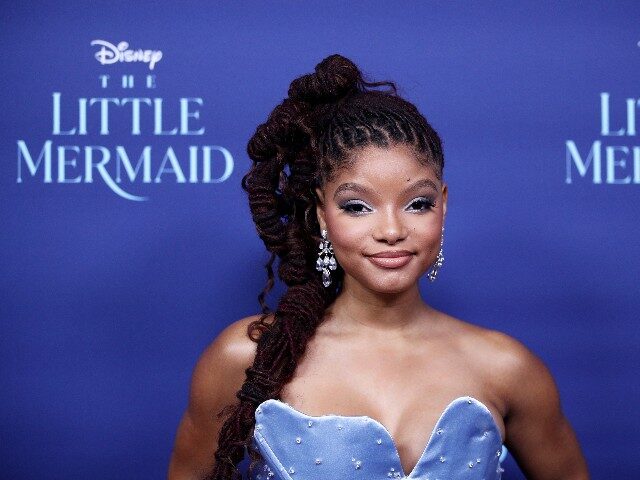The Chinese state-run propaganda newspaper Global Times continued its furious campaign against Disney’s live-action remake of The Little Mermaid on Friday, defending Chinese moviegoers from accusations of racism for their disinterest in the film, starring black actress Halle Bailey.
The Disney film debuted in both China and the United States on Friday. As of Thursday evening, the Global Times reported, ticket pre-sales in China stood at 600,000 yuan ($85,000), a feeble, at best, showing that the state publication insisted did not indicate any racism on the part of the audience.
The Global Times condemned Bailey’s casting in 2019, claiming that allowing the titular mermaid to appear black in the film was a needless “disruption of the character who originally appeared as a white princess with red hair in the Disney cartoon.” Following reports this week of shockingly low ticket pre-sales for the movie in China – and reports that Disney altered movie posters in China to make Bailey appear blue, rather than black – the state newspaper has repeatedly condemned both the decision to cast Bailey and concerns that the Chinese government, or Chinese viewers, were biased against the movie because of its black star. On Thursday, the Times condemned Bailey’s appearance in the film as a “lazy and irresponsible” way to include nonwhite faces in American entertainment.
“If the company truly wants to represent marginalized groups, why not create original stories that reflect their experiences instead of turning classic tales into ‘sacrificial lambs’ for political correctness?” the state publication asked.
On Friday, the Global Times escalated its rhetoric, describing The Little Mermaid as a weapon in the hands of “white leftist” activists meant to wrongfully attack the Chinese and impose “cultural hegemony.”
“Western ‘white leftist’ netizens use [of] their political correctness to kidnap Chinese audiences is naked cultural hegemony,” the Global Times proclaimed. “Some people simply don’t have a clue how to reflect on themselves but only stand on a so-called moral high ground to criticize others. Colonizing a group of people on Earth and then yelling at another group for not sharing its own guilty conscience – how convenient to always be the right one!
The state newspaper took particular issue with Western audiences noticing that Disney modified its poster for the film for Chinese audiences, making Bailey look blue-skinned underwater rather than her natural brown color:
Chinese Poster for The Little Mermaid are Leaving People Wondering why they made her blue pic.twitter.com/kz6oV6GRE0
— Geeks + Gamers (@GeeksGamersCom) May 22, 2023
“By criticizing Disney’s choice of photos for the promotional posters in different countries, these critics hint that Chinese audiences are ‘racist,’” the Global Times asserted, denying that Chinese audiences are racist and using Beijing’s disastrous Belt and Road Initiative (BRI) interventions in Africa as evidence.
“Unlike Western countries’ invasion of Africa, China’s efforts on the continent have been peaceful, supporting African countries to resist imperialism and fight for national independence and liberation,” the state newspaper claimed. “During the COVID-19 [Wuhan coronavirus] pandemic, Western countries only focused on themselves, but China began providing vaccines to Africa even when domestic supplies were tight.”
In reality, Chinese projects in Africa have brought with them a wave of anti-African racism into participating countries. In Kenya, Chinese leaders of BRI projects imposed “apartheid” systems that banned local workers from interacting with imported Chinese labor, going so far as to ban the Africans from using the same buses and cafeterias as the Chinese. Similarly, Zimbabwe has documented widespread accusations of physical abuse and racism by Chinese mining officials, which the socialist regime there has largely ignored.
Regarding China’s coronavirus vaccine products, the then-head of the Chinese Center for Disease Control (CDC), Gao Fu, admitted in 2021 that the doses “don’t have very high protection rates” against the virus. Multiple African countries, including Chinese allies, rejected shipments of coronavirus vaccine products due to a lack of storage facilities and, in some cases, a lack of public demand.
The Global Times dismissed criticism of both Disney for modifying the post and Chinese audiences as an attempt to “sow discord between China and African groups.”
The Chinese Communist Party has a long track record of anti-black racism, both in the entertainment it produces – the state’s Lunar New Year variety show has featured blackface twice in the past decade – and in its public policies. The country’s profile in Africa is still reeling from the imposition of racist segregation policies at the height of the Wuhan coronavirus pandemic in Guangzhou, a southern city home to a large African diaspora population, banning black people from hotels and restaurants on the false grounds that they were more likely to spread the virus.
In entertainment, Western companies, prominently including Disney, have been caught modifying promotional material for films to downplay the prominence of black actors. In 2015, for example, the Chinese version of the poster for Star Wars: The Force Awakens showed star John Boyega, of Nigerian ancestry, much smaller than on the Western release, despite Boyega playing one of the major characters in the film. More recently, the Chinese version of the poster for the 2021 film Dune removed a black actress shown prominently in the Western poster.
Follow Frances Martel on Facebook and Twitter.


